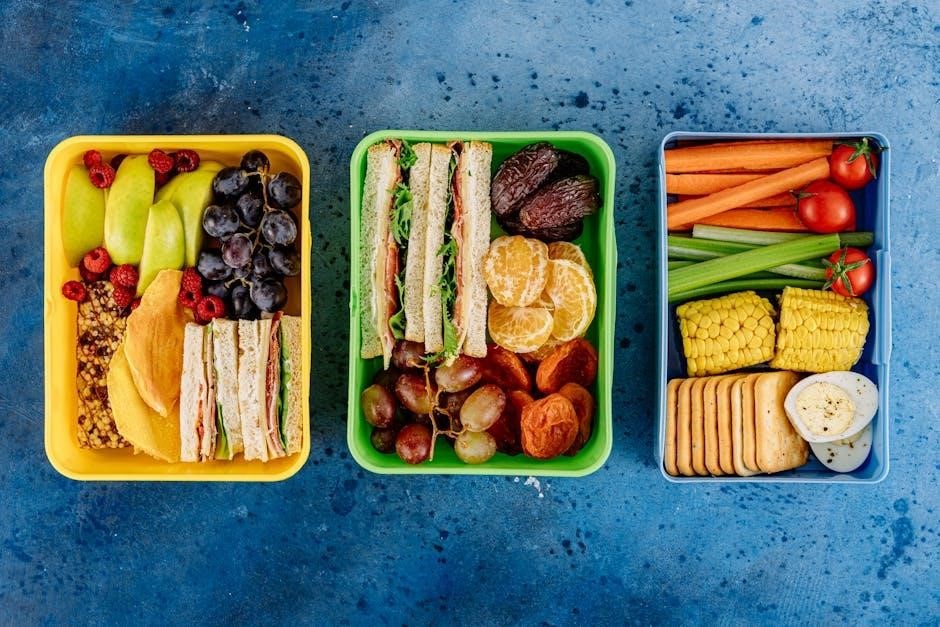A pancreatitis diet plan focuses on reducing inflammation, promoting healing, and managing symptoms through tailored nutrition, ensuring proper enzyme function and overall digestive health․
1․1 Understanding Pancreatitis
Pancreatitis is an inflammatory condition of the pancreas, which plays a vital role in digestion and blood sugar regulation․ It can be acute or chronic, with symptoms ranging from mild to severe․ Acute pancreatitis is a sudden inflammation, often triggered by gallstones or excessive alcohol consumption, while chronic pancreatitis is a long-term condition that can lead to permanent damage․ The pancreas produces digestive enzymes, and inflammation disrupts this function, causing pain, nausea, and digestive issues․ Managing pancreatitis involves reducing inflammation, preventing further damage, and ensuring proper nutrition to support recovery and overall health․ Understanding the condition is the first step toward developing an effective diet plan to alleviate symptoms and improve quality of life․
1․2 Importance of Diet in Managing Pancreatitis
Diet plays a crucial role in managing pancreatitis by reducing inflammation and supporting the healing process․ A well-structured diet helps minimize symptoms like pain and digestive issues while ensuring proper nutrient absorption․ It also helps maintain a healthy weight and prevents complications such as malnutrition or diabetes․ By avoiding trigger foods and focusing on balanced nutrition, individuals can alleviate the strain on the pancreas․ A tailored diet plan not only supports recovery but also enhances overall well-being․ Adhering to dietary guidelines can lead to better symptom control and improved quality of life for those with pancreatitis, making it a cornerstone of effective management․

Key Principles of the Pancreatitis Diet
The pancreatitis diet emphasizes avoiding trigger foods, managing fat intake, and ensuring proper nutrition to reduce inflammation and support digestive health while balancing carbohydrates and proteins․
2․1 Avoiding Trigger Foods
Trigger foods can exacerbate pancreatitis symptoms by stimulating the pancreas․ These include high-fat foods, spicy dishes, alcohol, and processed items․ Avoiding these helps reduce inflammation and discomfort․ Opting for low-fat, non-spicy, and nutrient-rich options minimizes strain on the pancreas, promoting healing and stability․ Patients should eliminate alcohol entirely, as it is a primary irritant․ Additionally, reducing caffeine and sugary foods can further alleviate symptoms․ Identifying and eliminating personal triggers is crucial for managing the condition effectively and preventing flare-ups․
2;2 Managing Fat Intake
Managing fat intake is crucial for individuals with pancreatitis, as excessive fat can trigger inflammation․ The recommended daily fat intake typically ranges between 30-50 grams, depending on the severity of the condition․ Emphasize low-fat or fat-free options, such as lean proteins, whole grains, and non-starchy vegetables․ Avoid fried foods, processed snacks, and high-fat dairy products․ Reading food labels to identify fat content is essential․ Distributing fat intake evenly across meals helps avoid overloading the pancreas․ Opt for healthy fats like avocado, olive oil, and nuts in moderation․ Balancing fat intake supports digestion and reduces the risk of complications, aiding in the overall management of pancreatitis symptoms․
2․3 Ensuring Proper Nutrition
Ensuring proper nutrition is vital for managing pancreatitis, as it supports healing and prevents malnutrition․ Focus on a balanced diet rich in carbohydrates, proteins, and healthy fats․ Carbohydrates, such as whole grains and vegetables, provide energy, while lean proteins like poultry, fish, and legumes aid in tissue repair․ Incorporate low-fat dairy products for calcium and vitamins․ Fruits and vegetables supply essential vitamins, minerals, and antioxidants․ Avoid nutrient deficiencies by including a variety of foods․ If pancreatic enzyme insufficiency is present, supplements may be necessary to enhance nutrient absorption․ A well-rounded diet helps maintain strength, supports digestion, and reduces the risk of complications, ensuring overall health and symptom management․ Proper nutrition is a cornerstone of effective pancreatitis care․

7-Day Pancreatitis Diet Meal Plan
This structured plan provides balanced meals to manage symptoms, promoting healing and digestive ease through nutrient-rich, low-fat, and enzyme-friendly food choices tailored for pancreatitis recovery․
3․1 Day 1: Breakfast, Snack, Lunch, Snack, Dinner
Breakfast: Oatmeal with berries and a drizzle of honey, providing gentle fiber and nutrients․ Mid-morning snack: Apple slices with almond butter for healthy fats and protein․ Lunch: Grilled chicken breast with quinoa and steamed vegetables like carrots and zucchini․ Afternoon snack: Plain, unflavored yogurt with a banana for probiotics and easy digestion․ Dinner: Baked cod with roasted sweet potato and green beans, ensuring a balanced intake of lean protein, complex carbs, and fiber․ Each meal is spaced to avoid overloading the pancreas, focusing on low-fat, nutrient-rich options․
3․2 Day 2: Breakfast, Snack, Lunch, Snack, Dinner
Breakfast: Scrambled eggs with spinach and a slice of whole-grain toast, offering protein and vitamins․ Mid-morning snack: A small pear with a handful of walnuts for fiber and healthy fats․ Lunch: Turkey breast wrap with lettuce, cucumber, and hummus in a whole-wheat tortilla, ensuring balanced nutrients․ Afternoon snack: Cottage cheese with pineapple chunks for probiotics and protein․ Dinner: Grilled salmon with brown rice and steamed asparagus, providing omega-3 fatty acids and complex carbs․ Each meal avoids high-fat and spicy foods, promoting gentle digestion and pancreatic health․
3․3 Day 3: Breakfast, Snack, Lunch, Snack, Dinner
Breakfast: Oatmeal with almond butter and a touch of cinnamon, providing sustained energy․ Mid-morning snack: Carrot sticks with guacamole dip for vitamins and healthy fats․ Lunch: Grilled chicken salad with mixed greens, cherry tomatoes, and balsamic vinaigrette, ensuring lean protein and antioxidants․ Afternoon snack: A banana with a tablespoon of peanut butter for potassium and healthy fats․ Dinner: Quinoa with roasted vegetables like zucchini and bell peppers, offering complex carbs and essential nutrients․ This meal plan maintains balanced nutrition while adhering to low-fat and anti-inflammatory guidelines, supporting pancreatic recovery and digestive comfort․
3․4 Day 4: Breakfast, Snack, Lunch, Snack, Dinner
Breakfast: Scrambled eggs with spinach and whole-grain toast, offering lean protein and vitamins․ Mid-morning snack: Apple slices with almond butter for fiber and healthy fats․ Lunch: Grilled turkey breast with quinoa and steamed vegetables, ensuring balanced nutrition․ Afternoon snack: A small Greek yogurt with berries, providing probiotics and antioxidants․ Dinner: Baked cod with roasted sweet potatoes and green beans, offering omega-3 fatty acids and complex carbs․ This meal plan emphasizes nutrient-rich, low-fat options to support pancreatic health while maintaining flavor and variety․
3․5 Day 5: Breakfast, Snack, Lunch, Snack, Dinner
Breakfast: Oatmeal with sliced banana and a handful of walnuts, providing sustained energy and fiber․ Mid-morning snack: A small serving of low-fat cottage cheese with pineapple chunks for protein and calcium․ Lunch: Baked chicken breast with brown rice and steamed carrots and peas, ensuring lean protein and balanced carbs․ Afternoon snack: One medium pear with a tablespoon of peanut butter for healthy fats and fiber․ Dinner: Grilled salmon with mashed cauliflower and sautéed zucchini, offering omega-3 fatty acids and low-fat, nutrient-rich options․ This meal plan emphasizes gentle, easily digestible foods while maintaining variety and nutritional balance․
3․6 Day 6: Breakfast, Snack, Lunch, Snack, Dinner
Breakfast: Scrambled eggs with spinach and whole-grain toast for a protein-rich start․ Mid-morning snack: Apple slices with a tablespoon of almond butter for fiber and healthy fats․ Lunch: Grilled turkey breast on whole-grain bread with a side of mixed greens and cherry tomatoes․ Afternoon snack: A small serving of plain, low-fat yogurt with fresh berries for probiotics and antioxidants․ Dinner: Baked cod with roasted sweet potatoes and steamed broccoli, providing omega-3 fatty acids and nutrient-dense vegetables․ This meal plan focuses on lean proteins, whole grains, and colorful vegetables to support pancreatic health and overall well-being․
3․7 Day 7: Breakfast, Snack, Lunch, Snack, Dinner
Breakfast: Start with oatmeal topped with fresh berries and a drizzle of honey for a gentle, fiber-rich option․ Mid-morning snack: Enjoy one small pear for natural sweetness and hydration․ Lunch: Grilled chicken salad with mixed greens, cucumber, and a light olive oil dressing․ Afternoon snack: Cucumber slices with a small serving of hummus for protein and fiber․ Dinner: Baked salmon seasoned with herbs, served alongside quinoa and steamed asparagus for omega-3 fatty acids and essential nutrients․ This meal plan emphasizes lean proteins, whole grains, and vegetables, supporting pancreatic health and overall well-being․

Foods to Eat and Avoid
A pancreatitis-friendly diet emphasizes lean proteins, whole grains, and low-fat options․ Avoid high-fat, spicy, and processed foods that may trigger inflammation or discomfort․
4․1 Recommended Foods for Pancreatitis
Individuals with pancreatitis should focus on consuming lean proteins like chicken, fish, and tofu, as well as whole grains such as rice, oats, and quinoa․ Non-fat or low-fat dairy products, like yogurt or milk, are also beneficial․ Steamed or cooked vegetables, including carrots, spinach, and green beans, are easily digestible and nutrient-rich․ Healthy fats, such as those found in avocado or olive oil, should be consumed in moderation․ Fresh fruits like bananas, apples, and berries provide essential vitamins and fiber without causing discomfort․ Staying hydrated with water, herbal teas, or low-sugar juices is crucial․ Additionally, incorporating pancreatic enzyme replacements can aid digestion․ Opting for smaller, frequent meals and avoiding spicy or high-fat foods helps manage symptoms effectively․
4․2 Foods to Avoid for Pancreatitis
Individuals with pancreatitis should avoid foods that trigger inflammation and discomfort․ These include high-fat foods like fried items, red meat, and processed snacks․ Spicy dishes, alcohol, and caffeine can irritate the pancreas and worsen symptoms․ Avoid sugary foods and carbonated beverages, as they can cause bloating and discomfort․ Processed meats, heavy sauces, and foods high in salt should also be limited․ Foods that are difficult to digest, such as raw vegetables or high-fiber foods, may exacerbate pain․ Reducing intake of refined carbohydrates and avoiding trigger foods tailored to individual sensitivities is essential․ Reading food labels to identify hidden fats, sugars, and spices can help make informed choices․ Consulting a healthcare provider for personalized dietary restrictions is recommended to manage symptoms effectively․
Nutritional Considerations
A pancreatitis diet emphasizes enzyme replacement, balanced fat, protein, and carbohydrate intake, and staying hydrated to support digestion and overall pancreatic health effectively․
5․1 Pancreatic Enzyme Replacement
Pancreatic enzyme replacement is crucial for individuals with exocrine pancreatic insufficiency (EPI), a common complication of pancreatitis․ These enzymes, taken before meals, help digest food properly, ensuring nutrient absorption․ They replace the enzymes the pancreas can no longer produce in sufficient quantities․ Proper dosing and timing are essential to prevent malnutrition and symptoms like diarrhea or weight loss․ Healthcare providers often tailor enzyme regimens to individual needs, considering the severity of EPI and dietary habits․ Consistent use of these enzymes, along with a balanced diet, supports overall health and manages pancreatitis effectively․ Regular monitoring by a healthcare provider ensures the treatment remains optimal and adjusts as needed․
5․2 Guidance on Fat Intake
Fat intake management is vital for individuals with pancreatitis, as excessive dietary fat can trigger symptoms․ While a very low-fat diet is no longer universally recommended, balancing fat consumption remains key․ Emphasize healthy fats like avocados, olive oil, and fatty fish, which support nutrition without overloading the pancreas․ Portion control is essential, with daily fat intake often advised to stay between 30-50 grams, depending on severity․ Avoid processed and high-fat foods that can exacerbate inflammation․ Reading food labels helps identify hidden fats, ensuring meals align with dietary goals․ Consulting a healthcare provider or dietitian can tailor fat intake to individual needs, promoting symptom relief and overall well-being․
5․3 Importance of Protein
Protein plays a crucial role in managing pancreatitis by supporting tissue repair and maintaining muscle mass․ Lean sources like poultry, fish, and plant-based options are ideal, as they minimize pancreatic strain․ Avoid high-fat meats and processed proteins․ Protein should be distributed evenly across meals to prevent overloading the pancreas․ Additionally, protein aids in enzyme production and digestion efficiency, which is vital for nutrient absorption․ Ensuring adequate protein intake helps prevent malnutrition and supports overall recovery․ Guidance from a healthcare provider can help determine the optimal protein intake based on individual health needs and pancreatic function․ Balancing protein with other nutrients is essential for a well-rounded diet․
5․4 Managing Carbohydrate Intake
Carbohydrates are a vital energy source for individuals with pancreatitis․ Focus on complex carbs like whole grains, vegetables, and legumes, which are easier to digest and prevent blood sugar spikes․ Avoid refined sugars and processed foods that can trigger inflammation․ For those with diabetes, managing carbohydrate intake is crucial to maintain blood sugar control․ Pairing carbs with protein or healthy fats can slow digestion and reduce pancreatic stress․ Portion control is key to avoid overwhelming the pancreas․ A balanced intake of complex carbs supports overall nutrition without exacerbating symptoms․ Consulting a dietitian can help tailor carb intake to individual needs and health conditions․
5․5 Staying Hydrated
Staying hydrated is essential for individuals with pancreatitis, as it helps maintain digestion and overall health․ Aim for at least 8-10 glasses of water daily, avoiding sugary or caffeinated beverages that can dehydrate․ Herbal teas and clear broths are good alternatives․ Proper hydration aids in thinning digestive enzymes, reducing the risk of blockages․ In acute cases, some patients may need intravenous fluids to manage dehydration․ Additionally, consuming foods with high water content, like cucumbers and melons, can contribute to hydration․ Avoid alcohol, as it can irritate the pancreas․ Consistent hydration supports healing and prevents complications, making it a cornerstone of pancreatitis management․

Implementing the Diet in Daily Life
Adopting a pancreatitis-friendly diet involves planning balanced meals, avoiding triggers, and staying consistent․ Focus on smaller, frequent meals to ease digestion and prevent pancreatic strain․
6․1 Eating Tips for Managing Pancreatitis
Adopting smaller, frequent meals throughout the day can ease digestion and reduce pancreatic strain․ Eat 5-6 small meals to avoid overwhelming the pancreas․ Spread fat intake evenly to prevent triggering symptoms․ Avoid trigger foods like spicy, fatty, or high-fiber items that may worsen inflammation․ Incorporate low-fat, nutrient-rich options such as lean proteins, whole grains, and steamed vegetables․ Staying hydrated is crucial, so drink plenty of water between meals․ Consider pancreatic enzyme supplements before eating to aid digestion․ Finally, consult a healthcare provider to tailor your diet to specific needs and ensure proper nutrient absorption․
6․2 Role of Supplements
Supplements play a crucial role in managing pancreatitis, particularly for those with exocrine pancreatic insufficiency (EPI)․ Pancreatic enzyme supplements are essential to improve nutrient absorption and prevent malnutrition․ These enzymes should be taken before meals to ensure proper digestion․ Additionally, vitamin and mineral supplements may be necessary to address deficiencies caused by poor absorption․ Always consult a healthcare provider to determine the appropriate dosage and type of supplements․ They can help tailor a supplementation plan to individual needs, ensuring optimal nutrient uptake and overall health․ Supplements are a vital component of a comprehensive pancreatitis management strategy, supporting both digestive function and long-term well-being․
6․3 Reading Food Labels
Reading food labels is essential for managing pancreatitis effectively․ Always check the fat content to avoid excessive intake, as high-fat foods can trigger symptoms․ Look for products labeled as low-fat or non-fat to stay within recommended limits; Additionally, opt for low-sodium options to reduce inflammation and avoid hidden sugars, which can worsen digestive discomfort․ Avoid processed foods with artificial additives, as they can irritate the pancreas․ Prioritize whole, unprocessed foods whenever possible․ Understanding nutritional information helps make informed choices, ensuring meals align with your pancreatitis diet plan․ This habit supports long-term health and symptom management, helping you maintain a balanced and therapeutic diet․
Monitoring and Adjusting the Diet Plan
Regularly track your diet, symptoms, and weight․ Adjust food choices based on how your body responds․ Consult your doctor for personalized advice and to refine your plan․
7․1 Tracking Diet and Symptoms
Monitoring your diet and symptoms is crucial for managing pancreatitis effectively․ Start by keeping a detailed food diary to record all meals, portion sizes, and any triggers․ Note how your body reacts after eating, including any pain, bloating, or digestive issues․ Additionally, track your weight and overall health indicators like blood sugar levels if applicable․ This data helps identify patterns and potential triggers, enabling adjustments to your diet plan․ Regularly reviewing this information with your healthcare provider ensures personalized recommendations․ Consistency in tracking helps maintain a balanced diet and prevents complications, promoting long-term pancreatic health and symptom control․
7․2 Regular Medical Check-Ups
Regular medical check-ups are essential for monitoring the progression of pancreatitis and ensuring the diet plan is effective․ During these visits, your healthcare provider will assess your symptoms, weight, and overall health․ Blood tests and imaging may be conducted to evaluate pancreatic function and rule out complications․ These check-ups also provide an opportunity to discuss any challenges with the diet plan and make necessary adjustments․ By maintaining consistent communication with your healthcare team, you can receive personalized guidance and ensure your treatment remains aligned with your needs․ Regular monitoring helps prevent complications and supports long-term pancreatic health․
7․3 Adjusting the Plan as Needed
Adjusting your pancreatitis diet plan is crucial to ensure it remains effective and tailored to your specific needs․ As your symptoms and health status change, your dietary approach may need to evolve․ Regular feedback from your healthcare provider, combined with your own observations of how certain foods affect you, will guide these adjustments․ For example, if you experience persistent discomfort after eating, your fat intake limits or enzyme replacement therapy may need to be reevaluated․ Similarly, if you notice improvements in digestion or symptom relief, your plan can be refined to incorporate more variety or flexibility․ This dynamic approach ensures the diet remains balanced, nutritious, and aligned with your long-term health goals․
Additional Resources
Access sample diet plans, templates, and comprehensive guidelines for managing pancreatitis․ Consulting with healthcare professionals ensures personalized advice and optimal care tailored to your specific needs․
8․1 Sample Diet Plans and Templates
Downloadable PDF guides offer structured 7-day meal plans tailored for pancreatitis management․ These templates include breakfast, snack, lunch, dinner, and snack options, ensuring balanced nutrition․ Sample plans often feature low-fat, high-fiber meals like oatmeal, steamed vegetables, lean proteins, and whole grains․ Practical templates allow customization to suit individual preferences and dietary needs․ Many resources provide grocery lists and portion guides, making meal planning easier․ These tools help patients adhere to dietary recommendations and maintain consistency in their eating habits․ Versatile templates cater to various stages of pancreatitis, from acute recovery to long-term management․ They emphasize nutrient-dense foods and avoid triggers, promoting healing and symptom relief; These resources are invaluable for creating a personalized pancreatitis-friendly diet․
8․2 Consulting Healthcare Professionals
Consulting healthcare professionals is crucial for creating a personalized pancreatitis diet plan․ Doctors, dietitians, and nutritionists provide tailored advice based on individual health needs, ensuring the diet aligns with medical guidelines․ They assess factors like enzyme levels, fat tolerance, and overall health to recommend specific foods and portions․ Regular check-ups help monitor progress and adjust the plan as needed․ Professionals also address complications like diabetes or malnutrition, offering strategies to manage symptoms effectively․ Their expertise ensures the diet is balanced, promotes healing, and prevents complications, offering reassurance and support throughout the recovery journey․ Collaborating with healthcare providers is essential for optimizing digestive health and managing pancreatitis long-term․



